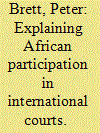| Srl | Item |
| 1 |
ID:
159208


|
|
|
|
|
| Summary/Abstract |
Africa has more international courts than any other continent, yet International Relations scholarship has failed to explain this move to law on the African continent. This article provides such an explanation using Jean-François Bayart’s concept of extraversion. It shows how the creation of international courts in the 1990s and early 2000s was the result of extraverted strategies for attracting international resources and pre-empting donor pressures for political and legal reforms. By adopting these strategies, African states failed to behave in the ‘strategic’ manner anticipated by both constructivist and liberal institutionalist International Relations theories. International court creation did not reflect the pursuit of national interests or a response to normative NGO pressures. Making this argument, the article analyses the design and ratification of two new international courts: the SADC Tribunal and International Criminal Court. Using the case studies of Zimbabwe and Kenya, it shows how global scripts were repeated by even those states which have, in recent years, most vocally asserted their national interests against these courts.
|
|
|
|
|
|
|
|
|
|
|
|
|
|
|
|
| 2 |
ID:
180257


|
|
|
|
|
| Summary/Abstract |
Coup leaders often purport to restore constitutional order. During Burkina Faso's 2014 ‘insurrection', however, Blaise Compaoré's opponents advanced detailed (international) legal arguments that significantly constrained their subsequent conduct. Theirs was to be a legal revolution. This article situates this stance within Burkina Faso's distinctive history of urban protest, whilst emphasising under-analysed international sources for the insurrection. ‘Insurgent’ lawyers, it argues, used international instruments to reinvigorate longstanding activist attempts to reconcile constitutional rights with a language of popular justice promoted by the revolutionary regime of Thomas Sankara (1983–7). After the insurrection, however, their emphasis on legality was used by Compaoré's supporters to expose the transitional authorities’ double-standards. Meanwhile, insurgent lawyers working for the transition had to work hard to reconcile (international) legal justifications for the insurrection with the expedient politics needed to defend the new dispensation.
|
|
|
|
|
|
|
|
|
|
|
|
|
|
|
|